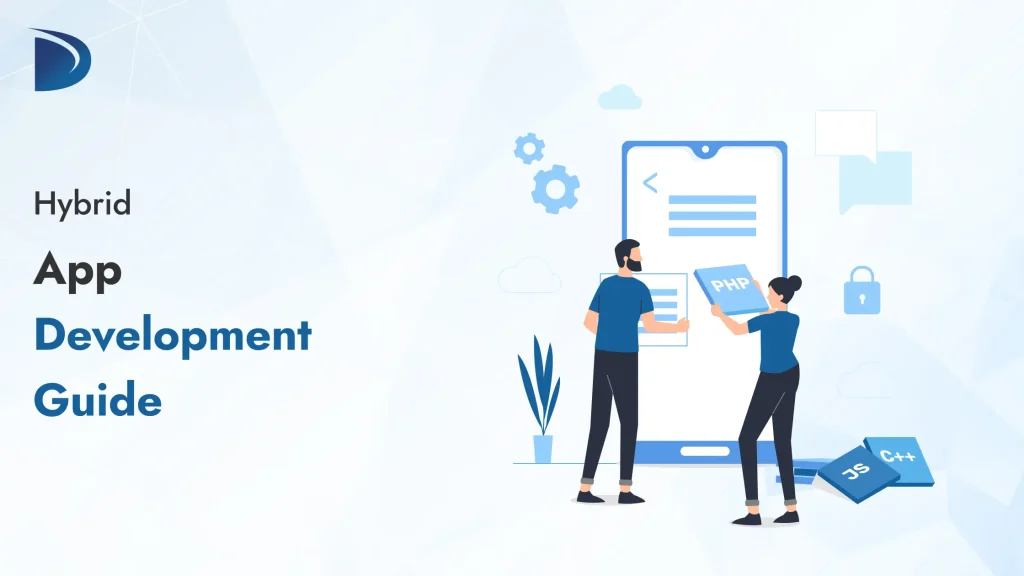Table of Contents
When developing a mobile application, first decide whether to create a native app, a web app, or a hybrid app. Each type has its own advantages and disadvantages.
Factors influencing your decision include budget, timeline, UI and UX considerations, future maintenance, and the expertise of the development team. Hybrid mobile app development offers a balanced approach, leveraging the strengths of both native and web apps to meet your specific needs.
Hybrid mobile apps represent a compromise between native apps and web apps. Hybrid mobile applications offer device and API capabilities. In other words, they aim to combine the best features of both.
Please review this blog to gain insights into hybrid apps, including their advantages and disadvantages. The following sections discuss hybrid app development frameworks, the top four hybrid app development frameworks, and how to choose the best hybrid app development company for your needs.
What is Hybrid App Development?
A hybrid app is a lightweight native app that allows a web app to access certain native platform capabilities and hardware features, such as the camera, calendar, push notifications, touch, and spread functionality, which a web application cannot. Like web applications, hybrid apps are primarily developed using standard front-end development tools and programming languages, such as JavaScript, HTML5, and CSS. They are multi-platform, able to deploy across various devices and operating systems.
Hybrid apps are available in app stores, have access to your phone’s hardware, and are installed on your device just like native apps. But what are the benefits and challenges of developing a hybrid app? Read below to find out!
Advantages of Hybrid App Development
Easy to develop
Hybrid apps are easier to develop than native apps because developers only need to write code for a single application. They do not have to learn separate programming languages for each operating system. HTML, CSS, and JavaScript are the most commonly used web technologies in hybrid mobile app development. Developers can also use frameworks such as React Native or Flutter.
Less time to launch
Hybrid app development allows companies to use their existing development tools to write application code. They do not need new technologies or to hire developers for platform-specific skills. The same code can be reused across multiple platforms, eliminating the need to maintain separate codebases. This approach saves significant time and reduces the time required to launch the app.
Cross-platform compatibility
Since most of the design process is similar across platforms, the cross-platform flexibility of a hybrid application is a significant advantage when developing on a budget. As a developer, you write code once and run it on multiple platforms. Hybrid apps are ideal for organizations that do not want to spend time and money developing separate iOS, Android, and BlackBerry apps.
Easy scalability
Scalability is a key factor in mobile app development. A scalable app offers flexibility, stability, and security, and can easily accommodate new functions and features. Hybrid mobile app development supports scalability because developers do not need to make major adjustments to scale the app across platforms. They can modify the code once, and the changes apply to all platforms.
Cost-effective
App development prices are quite high. Developing native applications for each platform is more expensive than creating a hybrid app because it requires more developers, resources, and time. A hybrid app does not require a platform-specific development kit. You do not need to hire separate development teams for different platforms, which saves money and increases profits.
User Experience
Hybrid mobile app development lets you reuse design elements across multiple operating systems. This ensures users have a consistent experience on any platform and also strengthens the brand’s image.
Simple maintenance
Hybrid app development is easy to maintain because developers do not need to manage multiple codebases or develop separate apps for different platforms. They can use a single backend and update apps across platforms simultaneously.
Disadvantages of Hybrid App Development
Slow performance
Hybrid apps require developers to write more code than native apps to function on multiple platforms, makes the app heavier and potentially degrading performance. Relying on a single codebase for multiple platforms means some native capabilities are missing from hybrid apps, which reduces performance and affects the user experience.
Launching new features takes time.
Hybrid app development often uses third-party frameworks that may not be updated regularly. Introducing new functionality typically takes longer than with native apps.
Test complexity
Testing hybrid software is more complex because developers must test it on multiple devices and platforms to ensure correct functionality. Many programs also share code across platforms. Some are native and written for a specific operating system, which further complicates testing.
Top 4 Hybrid Apps Frameworks
Here are the top 4 hybrid app development frameworks and their key benefits:
Ionic
Ionic is a framework that enables rapid prototyping of hybrid mobile applications using HTML, CSS, and JavaScript, and incorporates AngularJS for front-end development. In addition to being a robust toolkit for front-end development, Ionic offers attractive UI components as a paid feature, allowing quick creation of PWAs.
The Key Benefits of Ionic:
- Build applications using HTML, CSS, and JavaScript to share with web developers.
- Create applications for iOS, Android, and the web with a single codebase.
- Includes a collection of prebuilt components for fast development.
- Provides easy access to device native features and capabilities.
- Offers numerous resources, plugins, and community support.
Apache Cordova
Apache Cordova is a free platform that enables the development of mobile applications using web technologies such as HTML and JavaScript. It enhances mobile web applications by wrapping them in a native shell and providing access to device APIs through plugins, such as camera and GPS services.
Key Advantages of Apache Cordova:
- Build applications for iOS, Android, and Windows using a single codebase.
- Design mobile apps with technologies such as HTML, CSS, and JavaScript.
- Use multiple plugins to access the native capabilities of target devices.
- Support various front-end frameworks, including Angular, React, and Vue.js.
- Many plugins are available, and active development communities help users find necessary themes and resolve issues.
Framework7
Framework7 is a cross-platform framework that enables the design and development of mobile, desktop, and web applications with a native look and feel, using HTML, CSS, and JavaScript. Framework7 development focuses on building apps for iOS and Android with an attractive, native-style UI.
Key Advantages of Framework7:
- Provides an advanced, native-like user experience for applications on both iOS and Android.
- Enables development of mobile and web applications with a single codebase.
- Offers a range of pre-designed modals, tabs, lists, and more for quick development.
- Functions as an independent framework or can be used with popular frameworks like React and Vue.js.
- With integrated themes and styles, developers can fully customize the appearance of their applications.
Quasar Framework
Quasar Framework is a leading mobile and desktop development framework based on Vue.js. Quasar streamlines development by enabling a single codebase for various applications, including Progressive Web Apps (PWAs), hybrid apps, Electron apps for PC, server-side rendered (SSR) applications, and many other types of applications.
Key Benefits of the Quasar Framework:
- Built on the popular Vue.js framework, it provides a familiar and easy learning curve for Vue web developers, enabling them to create dynamic and high-performance web applications quickly.
- Build apps for iOS, Android, web (PWA), and desktop with Electron from a single codebase.
- Offers a wide range of pre-designed components and widgets to support development.
- Includes app deployment tools, such as hot reloading, and comprehensive documentation to accelerate development.
- Growing community support through a diverse set of plugins and resources.
Onsen UI
Onsen UI is a UI framework for developing hybrid mobile applications with HTML, CSS, and JavaScript. It emphasizes performance and adaptability, offering a wide range of pre-built components for creating mobile apps with a native feel on iOS and Android. Onsen UI integrates well with Angular, Vue.js, and React.
Key Advantages of Onsen UI:
- Design apps for iOS and Android using a single codebase.
- Access a variety of pre-designed components that provide a native-like user interface on both platforms.
- Works seamlessly with Angular, Vue.js, React, or without any framework.
- Engineered for performance, ensuring mobile users experience smooth animations and transitions.
- Easily customize app appearance to match the design standards of iOS and Android.
How to Choose a Hybrid App Development Company?
When searching for the best hybrid app developers for your business, you should consider several key factors. Here are the most important ones:
Experience
Hybrid mobile app developers should possess technological expertise. To fulfill all responsibilities involved in app development, they must be professionals in hybrid app development. Hiring skilled individuals ensures the app development process achieves the best results.
Cost
The app’s cost is another important factor to consider. Not every hybrid app developer charges the same rate, so first determine your budget. Set a budget and request a price estimate. Also, consider whether you want to save money or invest more upfront, which may lead to a higher ROI. Companies like Differenz System can help you build hybrid apps at a very low cost.
| Service Tier | Cost Range | Description | Best For |
|---|---|---|---|
| Basic Package | $5,000 – $15,000 | A simple hybrid app with basic functionality and design. | Small businesses or startups with a limited budget. |
| Standard Package | $15,000 – $30,000 | Larger businesses are aiming for high ROI with a comprehensive app. | Includes moderate complexity, custom features, and a more polished design. |
| Premium Package | $30,000 – $50,000+ | Advanced features, high-quality design, third-party integrations, and scalability. | Larger businesses aiming for high ROI with a comprehensive app. |
Key Considerations:
- Low-Cost Option: Some companies, such as Differenz System, offer competitive pricing for hybrid apps. While these budget-friendly solutions may save money initially, they may have limited features or slower development times.
- ROI Impact: Investing more upfront in a higher-tier service could lead to a more robust app and greater long-term return on investment (ROI).
Post-Launch Services
Just because the app is live does not mean the developer’s work is finished. Apps must be regularly maintained and updated. Therefore, ensure the developers can be contacted for future services and feedback. Ask the company if they provide app maintenance and update services.
Once you have gathered all relevant information about potential hybrid app development businesses, select the best one for your mobile app requirements.
Conclusion
In addition to running on any platform or device, hybrid apps are easy to design and download. They can also provide a native-like user experience by integrating native components.
As a result, hybrid app development has seen unprecedented growth in popularity. It allows advertisers to launch a single app across multiple mobile devices, reaching their target audience while saving time and money. If you want to develop a hybrid app, you can find top hybrid application developers to help you.

